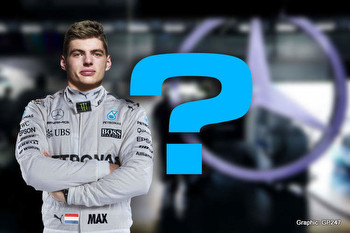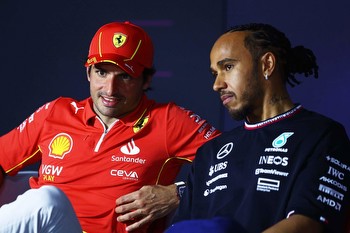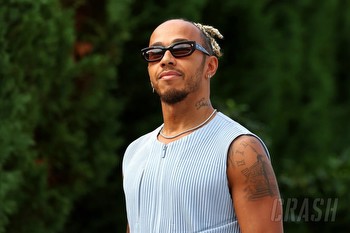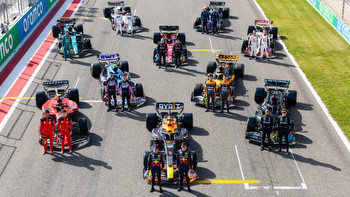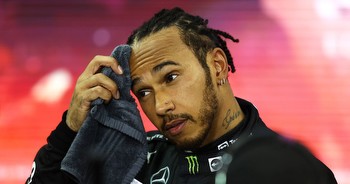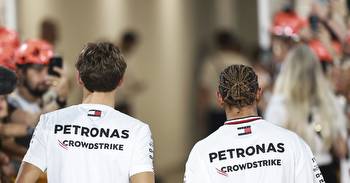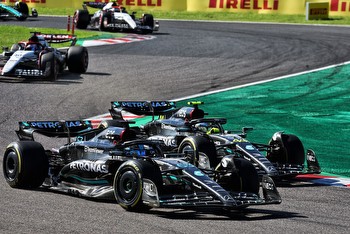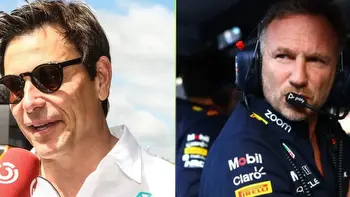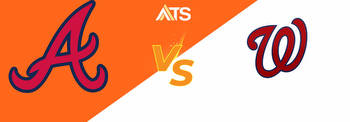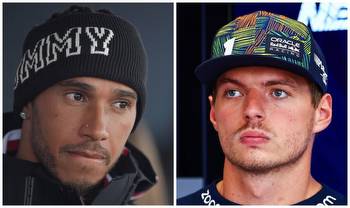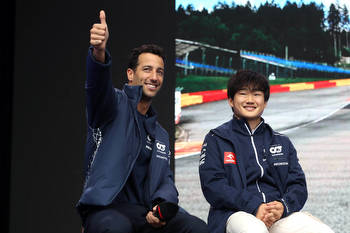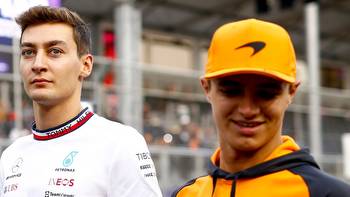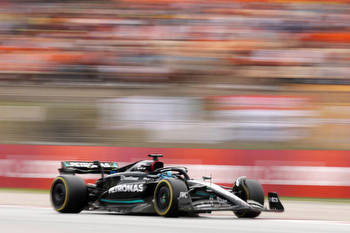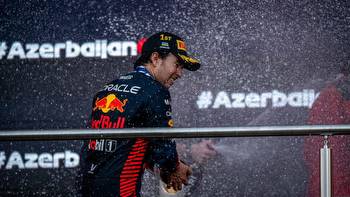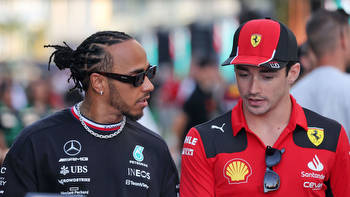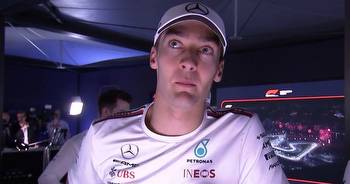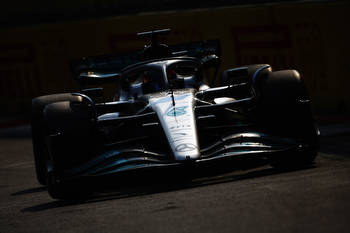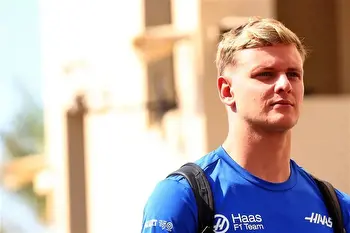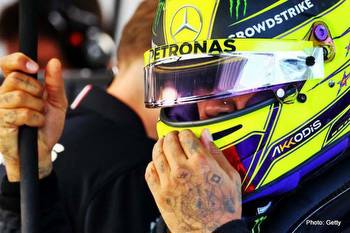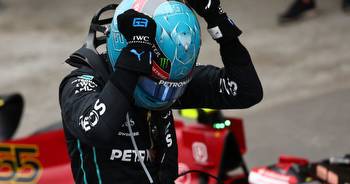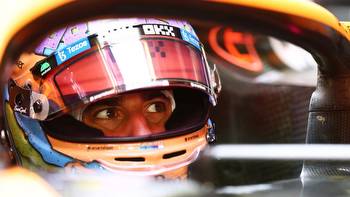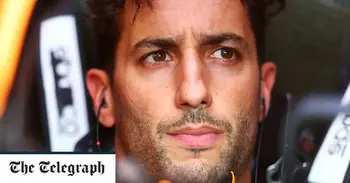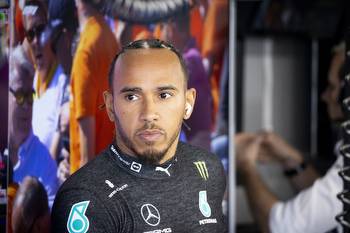George Russell’s F1 career-changing moments: PowerPoints and bathroom calls
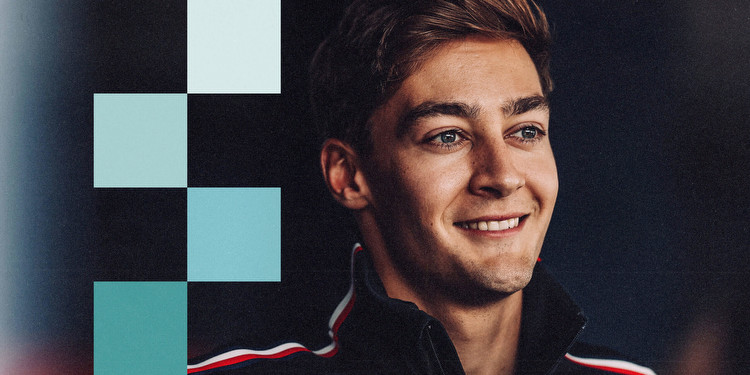
They call Formula One the “pinnacle of motorsports” for good reason. The global series features some of the world’s fastest and most sophisticated cars, most brilliant engineers, and most talented drivers. For the people in the sport, the climb to reach that pinnacle is the most daunting part of their careers.
The Athletic’s F1 coverage is designed to illuminate those sagas, and that’s what we’ll be doing in Origin Stories. Follow along as we take you beyond today’s news to understand how today’s players earned their starring roles.
In a twin hotel room in Abu Dhabi that he was sharing with his manager, George Russell was about to send an email that would define his career.
Russell, 16, was an up-and-coming driver who had just won his first single-seater championship in the UK, and was testing a GP3 car at the end of 2014. He’d arrived in the country just after the season-ending Formula One race at which Mercedes had celebrated its first double championship success, Lewis Hamilton clinching his second drivers’ crown.
Russell’s manager, Harry Soden, had got hold of Toto Wolff’s email address.
“Do you think we should drop him a line?”
Russell grabbed his laptop and put together an email to the Mercedes team principal, explaining who he was and attaching his racing CV. He asked for a meeting.
It was the first in a number of career-making sliding doors moments for Russell that would pave the way for him to become not only a grand prix winner with Mercedes, but an integral part of its F1 future.
“When I look back now, it’s all about timing,” Russell told The Athletic. “If I sent that email one week earlier, the Thursday of a grand prix, it probably would have gone in the inbox along with 100 other emails and it would have got lost.
“So timing is crucial in everything. That was that. Two months later, I was sat in his office.”
The first meeting
Russell arrived at Mercedes’ headquarters in Brackley, England in early 2015. He’d worn his best suit (Wolff said it was “sharp”, if a little ill-fitting) for a meeting he knew could be vital. After F4, the rising cost of racing meant he needed as much support as possible to realize his dream to drive in F1. Mercedes could play a big role in that.
Russell entered a room that included Wolff, Mercedes’ F1 sporting director Ron Meadows and Ulrich Fritz, who ran the Mercedes-backed HWA team in DTM, the German touring car series. “I went in as this young kid on my own thinking: ‘Jesus…’,” Russell recalled. “I was a bit overwhelmed.”
He held his own. He explained who he was and provided a PowerPoint presentation, a tactic Russell would also use down the line to make a case for a Williams F1 seat. The gist of the presentation was, in Russell’s words: “This is what sets me apart from the other drivers and why I think I’d be a great F1 driver for you in the future.”
One thing that set Russell apart was his confidence. Wolff suggested Russell would be best joining one of Mercedes’ affiliated teams in Formula Three, a German operation called Mücke Motorsport. Russell preferred to race for Carlin, a Britain-based team that had Volkswagen engines.
“I told Toto I hope that doesn’t close any doors with Mercedes in the future, but I feel like this is what’s best for my career,” said Russell. “I think he respected that, because I stuck with my beliefs and did what I thought was best, rather than, as a 16 year old kid, speaking with Toto Wolff, you’d obviously be quite lured into his advice and his view.”
Wolff did indeed respect that. “He was so straightforward that I liked it,” Wolff said. “And then obviously there was the famous PowerPoint presentation on why betting on him was the right thing to do. For a 16-year-old, that was pretty impressive.”
Mercedes’ bigger bet on Russell would come the following year. After a tough season in which Russell said he “struggled a bit with Carlin (and) struggled a bit personally”, he was offered a DTM test with BMW where he starred, outpacing its top race driver by over half a second. He was offered a professional contract with the manufacturer. But word of his performance had got back to Mercedes.
A few days later, Russell received a phone call from Gwen Lagrue, an F1 talent guru who had just joined Mercedes. “I was in the bathroom – I might actually have even been in the bath!” Russell said. “Gwen said: ‘I’ve just signed with Mercedes, and I want you to come with me.’ That’s how it all started.”
At 17, Russell had to choose between a longshot chance to someday drive in F1 and an immediate six-figure contract to drive in DTM, a series Russell respected and knew could give him a successful career. He took the gamble for a simple reason.
“It’s not F1,” he said.
“Perform and you’ll get your chance”
Russell’s two-year stint in European F3 had been difficult. The only team capable of winning was Prema, which was owned by Lawrence Stroll and was focused on helping his son, Lance, reach F1. It meant there was no place within its setup for Russell.
For his first full year as a Mercedes youngster in 2017, Russell moved to GP3 — now known as FIA F3 — and was eager to make up time by winning both GP3 and Formula Two at the first attempt.
Russell said the goals were “obvious” for both him and Mercedes, and that Wolff was always clear there’d be a path to F1 if he kept performing. “Toto always said to me: ‘You focus on your job, and I’ll sort everything else out. Perform, and you’ll get your chance.’” Russell said.
“They promised me if I won GP3, I’d get an F1 test at the end of the year.” Russell won GP3, and got two F1 practice sessions with Force India, a Mercedes customer team. He moved up to Formula Two for his rookie season with the same kind of promise. “They said to me if I won, I’d get the F1 seat the year after.”
Russell won the 2018 F2 title in style ahead of Lando Norris and Alex Albon, the trio all graduating to F1 the following year. But while Norris landed at McLaren and Albon joined Toro Rosso before a mid-season move to Red Bull, allowing both to compete for regular points, Russell had to bide his time at Williams, who finished last in 2018.
Williams would only agree to a deal for Russell if he signed a three-year contract with no exit routes. “It was a really challenging deal,” Russell said. “Claire (Williams, then deputy team principal) really had us by the balls.” The team’s alternative was retaining Russian driver Sergey Sirotkin, who brought significant sponsorship to a team in need of financial support.
Looking back, Russell understands why Williams was so firm, given her priority was the team, not his own progression. He took the seat despite the team’s struggles.
“We said, well it surely can’t be worse than 2018,” Russell said. “And boy, we got that wrong.”
Williams’ decline hit a new low in 2019, spending the year several seconds off the pace of the rest of the field. Russell had reached F1, only to scrap for second-last with his teammate at most races.
“It felt like I wasn’t competing,” Russell said. “You’d go to races, and it almost felt like a practice day.”
While Williams made a step forward for Russell’s second year in 2020, it still wasn’t quite quick enough to fight for points, making it “even tougher” for him to get his head around. A crash behind the safety car at Imola, something Russell has since called the biggest mistake of his F1 career, cost Williams a shot at points that “would have been huge” for the team. It ended the year with zero points.
But through the difficulty of 2020, Russell would make his greatest statement yet for a Mercedes F1 future.
Grabbing the opportunity
In December 2020, a second phone call taken in the bathroom would lead Russell to his next big career opportunity.
After attending a team barbecue that ran late into the night, Russell’s phone started buzzing at 2 a.m.: It was Wolff. Lewis Hamilton had tested positive for Covid-19, and would not be racing for Mercedes at the second of the two races in Bahrain. With Williams’ permission, Russell would step into the Mercedes car for the weekend. “It was a bit unexpected,” Russell said. “That all happened very quickly.”
Wearing race boots one size too small so he could fit into Hamilton’s cockpit, Russell qualified second, just 0.026 seconds behind Mercedes regular Valtteri Bottas. He took the lead at the start and dominated proceedings, only for a pit stop error by Mercedes and a late puncture to deny him a likely victory. Russell finished ninth, crestfallen. Yet his performance, especially compared to Bottas, the man he would have to displace for a full-time Mercedes seat, had proved plenty.
Andrew Shovlin, Mercedes’ trackside engineering director, said there was “no doubt” over how good Russell was from his very first F1 test outings for Mercedes. “But for us, the bit where you realized he was pretty impressive was when he jumped in when Lewis had Covid,” he said. “He did a great job with a lot to take on, very little time to adapt to the team or the car.”
With his three-year deal at Williams expiring and his case only strengthened by more impressive displays through 2021, Russell finally got his chance with Mercedes for 2022. While his first season was tough as Mercedes struggled to compete with Red Bull and Ferrari, he would end the year ahead of Hamilton in the standings and, importantly, as a grand prix winner, leading the team to a one-two in Brazil.
It means Russell does not regret what happened in Bahrain. “We can’t live in the past,” he said. “I would have loved to have won that race. But being sat here today as a one-time F1 race winner or a two-time F1 race winner, I would have no bigger or no less a smile on my face.
“If I got to the end of my career, I had no victories to my name, and I knew that was a guaranteed victory, for sure I’d have been pretty pissed off. But we’re climbing this ladder up the mountain, and once you’ve done one step, you’re looking at the next step.”
Embracing stability
2023 has been a tricky season for Russell. Mercedes again hasn’t been able to fight at the very front, the year being dominated by Red Bull. He’s 75 points behind Hamilton in the championship in part due to some missed opportunities and bad luck, but also — Russell believes, at least — due to his own struggle for peak performance earlier in the season.
Since the summer break, Russell has come back with a fresh view on things that has helped him take a step forward, he claims by going “back to basics” in his approach. His valiant bid for victory in Singapore ended with a last-lap crash, paying the price for a misjudgment of millimeters. An ambitious strategy in Japan didn’t quite pay off. Mercedes has always maintained its total confidence in his performance, to the extent Wolff said Russell’s concerns over losing form earlier in the year were “myth”.
“It’s just been a lot of missed opportunities and stuff we learned from,” said Russell.“But in terms of pure performance, I think I’m performing better than ever.
“I’m really happy with how I’ve been working with my team and have been delivering, and how I’m also bouncing back from some difficult races.”
Mercedes is happy too. Last month, it announced Russell and Hamilton had both extended their F1 deals to the end of the 2025 season. By then, it’ll have been more than a decade since Russell sent that email to Wolff.
“Wow, I didn’t even think about that!” Russell replied. He said the extension was “never in doubt” and a mere formality. His intention from a young age has been to stay with Mercedes “almost forever.”
“We don’t need a 10-year or five-year or three-year deal to show that commitment,” he said. “It’s clear that we’re in this together. We spoke about signing a contract for a much longer duration.”
Whenever Hamilton opts to retire, Mercedes has a ready-made successor in Russell to lead the team for the long-term. Its faith in him has been there from the very start, and has been rewarded at every opportunity. Plucky emails and PowerPoint presentations may have helped Russell along the way, but he has delivered when it mattered.
“We’re on this journey together,” Russell said. “I back myself, I back Mercedes. I believe in them. I see us continuing for many years to come.”
The “Origin Stories” series is part of a partnership with Chanel. The Athletic maintains full editorial independence. Partners have no control over or input into the reporting or editing process and do not review stories before publication.
(Lead image of George Russell: Ryan Pierse/Getty Images; Design: Samuel Richardson/The Athletic)

